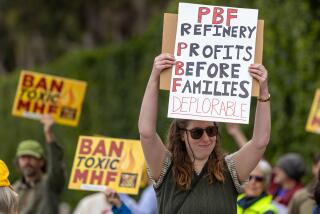Water in Tank Blamed for Bhopal Toxic Gas Disaster
- Share via
DANBURY, Conn. — Union Carbide Corp. today blamed water contamination in a gas storage tank--either inadvertent or deliberate--for the worst chemical accident in history, a toxic gas leak at its Bhopal, India, pesticide plant that killed 2,500 people.
Ron Van Mynen, corporate director of health and safety for Union Carbide and chairman of the investigating team, told a news conference that four months of intense scrutiny showed that water and iron were involved in the chemical reaction that set off the toxic leak, which also caused thousands of injuries.
From “120 to 240 gallons of water inadvertently or deliberately could have been introduced” into the tank of methyl isocyanate gas, Van Mynen said. “The water was responsible for the heating of the tank,” building up pressure that cracked the concrete with the gas released Dec. 3, 1984.
Troubles With Interviews
“We were limited by our inability to promptly interview the people involved,” Van Mynen added.
Union Carbide faces billions of dollars in lawsuits filed against it in connection with the tragedy.
The leak of methyl isocyanate gas from the Bhopal factory also halted production of the chemical at a similar Union Carbide plant in Institute, W.Va. A decision to end production of the chemical could mean layoffs for up to 700 people, carrying a payroll of $20 million, there.
The company has said it was prepared to restart production in early April, depending on the findings of the Bhopal investigation. The effect of today’s report was not immediately known.
The pesticides factory in Bhopal has remained closed since the leak, and the future of its 600 Union Carbide employees and several others dependent on the plant remains uncertain.
The company had nearly 100,000 employees worldwide in 1983 and sales of more than $9 billion.
Three Dozen Lawsuits
More than three dozen lawsuits asking for several billion dollars in damages have been filed in the United States on behalf of the victims of the Bhopal disaster.
Many of the suits have been consolidated in federal court in Manhattan, where a pretrial conference is scheduled April 16.
Union Carbide, perhaps best known for its Eveready batteries and Glad trash bags, continues to hold separate discussions with Indian government officials in an attempt to reach an out-of-court settlement for compensation.
Methyl isocyanate is a chemical intermediate that is considered a raw material in the production of pesticides.
More to Read
Inside the business of entertainment
The Wide Shot brings you news, analysis and insights on everything from streaming wars to production — and what it all means for the future.
You may occasionally receive promotional content from the Los Angeles Times.










